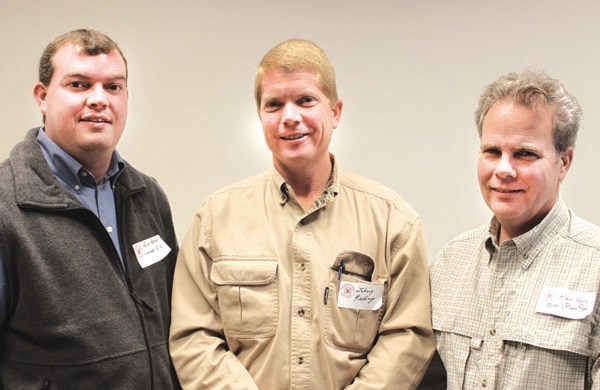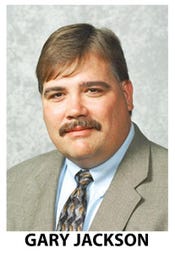
“While many states have closed their county Extension offices, Mississippi continues to be pro county Extension,” says Gary Jackson, director of the Mississippi State University Extension Service. "We’re nearing the 100th anniversary of Extension in 2014, and we're really proud of the organization's heritage, where we are, and where we’re going.”

The Mississippi Extension Service “is pretty much the last man standing" in terms of agricultural service agencies in many local communities around the state, says Gary Jackson.
“In years past, every county had an FmHA office, an SCS office, and other federal agencies,” he said at the annual meeting of the northeast Mississippi Producer Advisory Council, held at the Northeast Regional Extension Center at Verona. Producers, agribusiness representatives, community leaders, and other agriculture stakeholders attended the council meeting.
“Now, because of budget cuts, many of those federal agencies are gone, moved to the regional level,” Jackson says. “But because of the excellent support Extension continues to have in Mississippi, we still have offices in every county, providing a conduit to the grassroots level.
“Now, we’re seeing a number of these federal agencies coming to the Extension Service and wanting to partner with us to deliver their educational information. And because we have such an established information pipeline, in many instances we’re able to develop these federal/state partnerships.
“While many states have closed their county Extension offices, Mississippi continues to be pro county Extension,” Jackson says, “and we’re pleased at that. We’re nearing the 100th anniversary in 2014, and really proud of the Extension heritage, where we are, and where we’re going.”
Mississippi Extension is currently going through a restructuring/reorganization period, he notes.
“We’re trying to establish a base model where every county will have two professional Extension agents— one will have responsibility for agriculture and natural resources, the other, family and consumer sciences.
“We’re also working at the statewide, regional, and county levels to achieve more direction in program planning and to ways to meet priorities for the future.
“We know we can’t do everything — but there are major commodities and major issues that the Experiment Stations and Extension Service can partner together on, conduct research, and then apply that research for benefit of the people of our state and to enhance quality of life.”
The programming models, Jackson says, “will help us to more effectively coordinate our programs and services, and to better connect our local and regional agents, specialists, and Extension faculty.
“We’ll be using a population base to add a third or even a fourth agent in some of the counties with higher populations. We’ll also be looking at the major commodity needs in counties as we restructure and add personnel.”
A new regional specialist position has been created, he says, that “will help us tailor our services and information to the various geographical regions of the state and their differing needs.
“Our Extension service has a tremendous knowledge base to provide an excellent foundation for these programs and services. We’re very proud of our Extension and research faculty and the science and knowledge they put into the pipeline to be available to our citizens.”
The Extension Service “is needed more than ever,” Jackson says, for agricultural production, consumer education, youth development through 4-H programs, and community development.
“Extension is not only continuing to do things the old-fashioned way, on a face-to-face basis, but we’ve been able to utilize the very best technology to expand these benefits. From the Bost Extension Center on the Mississippi State University campus, we’re wired to more than 200 Extension offices throughout the state to conduct live audiovisual seminars, short courses, and other teaching/information events.
“We have tremendous structural capacity for websites, blogs, and other means of disseminating information and facilitating interchanges with our faculty and Extension/research personnel,” Jackson says.
Among livestock sector recommendations made by producer committees at the advisory council meeting were:
· Beef: “We need development of dependable cool season perennial grasses adapted to north Mississippi,” said Jacob McGehee. “Also, research on lespedeza and summer legumes; use of implants, ionospheres, and management practices for bull calves; and management of wild hogs, dogs, buzzards, and other predators.
“Also, we’d like to see education programs and training in the economics and management practices for various beef enterprises.”
· Dairy: “We’d like to see a recognition of the need for more dairy production research,” said Grandy Ladner. “Dairying continues to dwindles in Mississippi — we’ve lost 100 dairies since 2006 — and we need ideas for encouraging growth of the industry.
“We’d also like to see continued research into pasture-based milk production; research and education in summer forages such as sudangrass and forage corn; and a junior livestock program to enhance education of our youth about sound animal husbandry practices.”
· Equine: “We need an Extension equine specialist,” said Sadie Gardner. “This is a $1.02 billion industry in Mississippi, with increasing numbers of local events and opportunities at the community level.
“We’d like to see our veterinary school include more experimental services and provide drug testing for horse shows, along with an increase in the number of large animal veterinarians, and an equine youth development program.”
· Goats: “There is much more interest in goat production to serve growing ethnic markets,” said Jimmy Howell,” and numbers in the state doubled in the last year. Goats take a lot less area for production than larger livestock.
“We’d like to see specific goat research at Mississippi State University, more research into parasite control, nutrition supplements, forage varieties, and vaccinations/herd health.”
· Swine: “We feel there is a need for more assistance in meeting and dealing with all the regulations that are becoming an increasing challenge for swine operations,” said Byron Wilson, Sr.
“We’d also like to see some work on alternate uses for empty swine facilities, and Mississippi State University support for dealing with increasingly stringent environmental regulations.
About the Author(s)
You May Also Like



